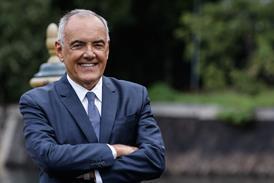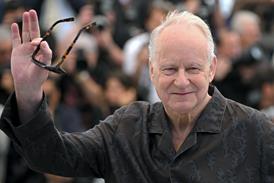The airline rights business is soaring as on-demand in-flight systems introduce a wider range of independent and international films to discerning passengers. But rising fuel costs, fewer flights and the arrival of on-board internet access could signal turbulence ahead. John Hazelton reports
If airline sales once flew under the radar of many independent film sellers, they aren’t any longer. Thanks to the introduction of in-flight entertainment systems offering passengers multiple film choices, airlines, especially international carriers, now have a greatly increased appetite for films (although films screened via overhead projector for a plane’s main cabin still command the highest prices).
And while the Hollywood studios may have benefited most from the appetite boost, independent sales companies have also developed a lucrative business dealing with airline rights distributors. Though statistics on airline deals and film viewing are hard to come by, sales executives and rights distributors say airline revenue for an indie film can range from tens of thousands of dollars to as much as $2m.
“If it’s a really commercial film with a great cast that’s going to be booked in the main cabin on airlines all over the world, you can make into the millions on your in-flight,” says Clay Epstein, vice-president of sales and acquisitions at The Little Film Company, whose South African comedy Spud recently secured an airline deal.
‘Once, an airline might have booked 16 titles a month. Now they’re looking at six or seven’
Betsy Hamlin, CineSky Pictures
To exploit their airline rights, most independent sales outfits work with one or more of the five established airline rights distributors, all based in the US, or with one of the newer entrants such as Hong Kong-based Encore or Southern California’s Penny Black Media. Most of the distributors have output or first-refusal deals with one or two bigger sellers and then compete for rights to individual films to top up their release schedules of two to four titles a month.
Airline distributors often come in for projects at script stage, taking international, domestic or worldwide airline rights (domestic airline rights are sometimes held back by sellers as a bonus for domestic theatrical distributors). Most distributors will either work on a straight distribution fee basis or put up a minimum guarantee for the rights and take a 15%-40% cut of revenue from airline bookings.
Distributors then pitch the titles to carriers and the content service providers that work with groups of airlines on in-flight entertainment selection and logistics. Airlines pay a per-flight fee that varies according to whether a film screens for an entire cabin or as part of the on-demand selection for individual seat-back screens.
Films are usually available for airline screening 60 to 90 days after their theatrical release in the airline’s home territory, although sellers and distributors sometimes arrange hold-backs to avoid clashes with openings in certain markets. However, the old rules about which films do and don’t work for airlines are changing, thanks to on-demand systems on aircraft.
“[Airlines] are much more liberal about what they take than they used to be, because it’s not the whole plane watching any more,” says Charlotte Mickie, senior vice-president of eOne Films International, which recently signed deals on psychological drama The Hunter and French-Canadian comedy Starbuck. “And their taste is quite good and adventurous,” she adds.
Anything involving a plane crash is out, of course. And horror films are still tricky, according to sellers, as are films depicting much in the way of sex or violence. Even with on-demand seat-back screens, airlines are still wary of children being accidentally exposed to material aimed at adults.
But action films (edited if necessary), thrillers, broad comedies and romantic comedies are all strong airline sellers, while arthouse titles are gaining acceptance, particularly with airlines that want to project a classy image. Foreign-language films have potential for airlines flying into or out of the country where that language is spoken.
Films that made little mark theatrically can sometimes find a niche in the airline market. Australian crime drama Animal Kingdom exceeded expectations on its in-flight run, says eOne’s Mickie, and Catherine Zeta-Jones drama Death Defying Acts “wasn’t released very widely at all in the US but did incredibly well on the airlines”, according to Lisa Gutberlet, vice-president of distribution at the film’s sales company Myriad Films (whose recent airline deals have involved drama Main Street and Sundance comedy Happythankyouplease).
The big question now for independent sellers is whether the airline rights market can remain buoyant as airlines adjust to new economic realities.
‘In the past I was able to sell pretty much everything to the airlines and now they’re pretty selective’
Elias Axume, Maya Entertainment
Faced with rising fuel prices and other financial pressures, some domestic US carriers have been experimenting with increased charges for in-flight films, more use of television programming and even the exclusion of films altogether. And international carriers have been cutting down on flights, effectively reducing their payouts to film rights holders.
“The airline situation right now is pretty tough, it’s not like two or three years ago,” says Elias Axume, president of international distribution at Maya Entertainment, which recently licensed Café, A Bag Of Hammers and Across The Line to airline distributors. “In the past I was able to sell pretty much everything to the airlines,” Axume adds, “and now they’re pretty selective.”
Airline rights revenues could be eroded further as in-flight technology evolves — on-board internet access will soon give passengers an attractive alternative to watching films — and competition to provide carriers with cheaper in-flight options increases.
Some airline rights distributors believe volume deals between carriers and the Hollywood studios for low-cost library films have already significantly reduced the number of in-flight slots available for independent fare, especially on domestic flights. And competition between content service providers to supply airlines with in-flight packages at ever lower rates is pushing prices down, the distributors argue.
“Once upon a time [an airline] might have booked 16 titles a month,” says Betsy Hamlin, president and co-owner of airline rights distributor CineSky Pictures. “Now they’re looking at six or seven and rolling over titles from the month before.”
Library deals with the studios have “affected us dramatically”, Hamlin goes on. “Fewer channels are being booked, smaller prices are being paid and more and more classic titles are being used.”
The hope among independent film sellers and rights distributors is that even in difficult economic times airlines will still see the value in films and other kinds of in-flight programming.
Airlines, says Bill Grant, president of rights distributor Entertainment In Motion, “are always looking to cut costs wherever they can. But in-flight entertainment is extremely important to them now. It used to be way down at the bottom of the list when they did passenger surveys; now it’s near the top.”
Flying high
The five leading airline rights distributors tell John Hazelton about the kinds of films they believe work best at 10,000 feet
Captive Entertainment
Captive Entertainment, co-founded 11 years ago by former Sony executive Paul Poste and based in Los Angeles, distributes to international and sometimes US airlines, handling two or three titles a month.
Current offerings from the company, which recently recruited Deanna Bellama to assist with feature film acquisitions and sales, include documentary Cinema Is Everywhere, Israeli comedy The Band’s Visit and Woody Allen’s Midnight In Paris.
Captive looks mostly for “light-hearted fare”, says Poste, picking up films individually or in small packages. It has what Poste describes as “informal arrangements” to handle titles from the UK’s WestEnd Films and Netherlands-based Fortissimo Films and works with sellers including Voltage Pictures, Essential Entertainment and Spain’s Imagina.
CineSky Pictures
CineSky handles mostly international airline rights on about three films a month, aiming for a mix of mainstream and specialised titles. “I try to have a really high-profile film and then a solid arthouse film and maybe a documentary or something a little smaller,” says president and co-owner Betsy Hamlin.
Los Angeles-based CineSky has right-of-first-refusal deals with Sierra/Affinity, Inferno Entertainment, Parlay Films and the UK’s Ealing Metro International and also works regularly with Mandate Pictures. Recent in-flight successes have included The Visitor and Michael Winterbottom’s The Trip while current offerings include 50/50, Killer Elite and The Bengali Detective.
Working alongside Hamlin, whose background in airline sales and marketing includes stints with Sony Trans Com and Warner Bros, are director of operations Shani Tuch and director of sales Nina Plotner.
Entertainment in Motion
Founded in 1988 by chairman/CEO Michael T Covell, a non-theatrical veteran whose career includes stints at Hal Roach Studios and MGM, Entertainment In Motion (EIM) is one of the major players in the airline distribution business. Covell runs the company with president Bill Grant, who previously worked at Warner Bros.
The Los Angeles company, which has output deals with Lionsgate (for which it handles worldwide airline sales) and Relativity Media and handles most of the output of Summit Entertainment, distributes about 50 films a year to more than 130 airlines around the world.
Current titles include The Three Musketeers, Margin Call and Mural and the company also has a short programming library that includes TV series Mad Men and Weeds.
In addition to the US films, EIM handles select titles from Europe and China picked up by Maria Mason, the company’s UK-based director of European sales, and Jacqueline Ho, EIM’s Hong Kong-based director of sales and acquisitions for Asia.
Jaguar Distribution
A pioneer in independent airline rights distribution, Jaguar was founded in 1981 by Jeff Klein, who had previously worked at Warner Bros and United Artists and as an in-flight buyer.
Jaguar, whose executive team also includes vice-president of sales Peter George, began competing with the Hollywood studios by focusing on quality independent films from the UK and elsewhere and, says Klein, the company still looks for “a compelling story and recognisable cast”.
The company has output deals with UK-based sales operations Pathé International and The Works but picks up the majority of the 24 to 40 titles it handles a year — mostly for international distribution only — one at a time. Jaguar’s library includes Slumdog Millionaire, Project Nim, Winter’s Bone and In The Loop while among upcoming offerings are A Dangerous Method and Carnage.
To feed the growing airline demand for classics, Jaguar recently picked up a Saul Zaentz package that includes Amadeus and One Flew Over The Cuckoo’s Nest.
Terry Steiner International
New York-based Terry Steiner International (TSI) works with film suppliers including The Weinstein Company, MGM and FilmNation and handles US and foreign-language features, documentaries and TV series. TSI titles include Shakespeare In Love, Bridget Jones’s Diary and Life Is Beautiful while among new offerings are Last Night, The Artist and My Week With Marilyn. It recently announced it will represent Miramax in the in-flight and military markets.
According to one sales company executive, TSI works only on a straight distribution basis and does not put up minimum guarantees.
Terry Steiner, the former Orion Pictures executive who founded TSI in 1993, says: “The terms of all my contracts are highly confidential and strictly between me and my clients.”
Cabin fever
Will studio films continue to drive in-flight programming? John Hazelton reports
Airline sales are a significant business for the Hollywood studios — bringing each of the six majors an estimated $20m-$40m in revenue a year — but the business model varies from one studio to another.
While several studios have executives in their theatrical distribution departments handling airline and other non-theatrical sales, Sony has a dedicated Sony Pictures Inflight division and NBCUniversal deals with non-theatrical sales through the cable and new media distribution unit of its television division. The latter has an exclusive deal to provide American Airlines with an in-flight video magazine comprising off-network TV programming and other material.
Direct routes
While some studios deal with content service providers such as IFE Services and Spafax — companies that select in-flight entertainment programming for groups of airlines and handle the logistics of its acquisition — others work directly with the airlines themselves.
The nature of studio deals with airlines has evolved from traditional per-flight, per-film arrangements into a mix of picture-by-picture deals, output or package deals and annual deals involving library as well as current titles.
Studio executives appear confident that even as in-flight technology changes and passenger options increase, demand for studio films and TV shows will remain high.
“From a passenger point of view it will expand their choice,” says Julian Levin, the executive vice-president at 20th Century Fox who oversees its non-theatrical business. “From a content provider’s point of view, when it comes to movies and -television programming I don’t see a decline because that’s always the locomotive that drives everything else.”
Frances Manfredi, president of NBCUniversal Cable and New Media Distribution, suggests the new in-demand options will only increase the studio’s revenue stream. “We believe that changing consumption preferences and the resulting new content offerings actually provide an opportunity for distributors to potentially exceed our existing revenue expectations in this market,” she says.



















No comments yet